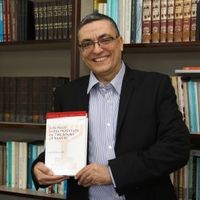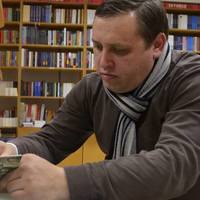
Ov Cristian Norocel
I am Associate Professor (docent) and Senior Lecturer (lektor) in Gender Studies at Lund University (Sweden). Previously, I undertook my Marie Skłodowska-Curie Individual Fellowship (2017-2019) in the Atelier Genre(s) et Sexualité(s), Faculty of Philosophy and Social Sciences / STRIGES, ULB Institute for Human Sciences) at Université Libre de Bruxelles (Belgium).
For my postdoc project (EUPOPCOM) (2014-2017) I was part of CEREN (Centre for Research on Ethnic Relations and Nationalism), the University of Helsinki (Finland) and Postdoctoral Visiting Fellow in the Department of Government, Uppsala University (Sweden) (2016-2017). I was also a Junior Researcher in the Center for Social Sciences, Hungarian Academy of Sciences (Hungary), part of the RADAR project (2015-2017). As acknowledgment of my research and teaching skills, I was awarded the title of Docent in Political Science, at the University of Helsinki (Finland).
Previously, I have worked as a Senior Lecturer (vik.) in the Department of Political Science, at Stockholm University (Sweden) (2014-2015). My teaching was done both in English and Swedish.
In December 2013 I have defended my PhD dissertation pertaining to the discursive manifestations of radical right populist ideology from a gender perspective. I started my PhD research project in January 2007 in the Department of Political Science, University of Helsinki. More specifically, the project entailed a cross-country analysis of the extremist masculinity ideals developed and promoted by the means of nationalistic discourses in two countries across Europe, more specifically, Sweden and Romania. The empirical material of my study were the discourses of the chairpersons of two radical right populist parties (Sweden Democrats, respectively Greater Romania Party) in the first decade of the third millennium. The aim was to cast more light on the specific places of resistance against gender equality, and against the processes of EU integration. In the context of my PhD studies, I was a visiting Postgraduate Researcher in the Department of Political Science, Stockholm University (April 2008 - December 2013).
For my postdoc project (EUPOPCOM) (2014-2017) I was part of CEREN (Centre for Research on Ethnic Relations and Nationalism), the University of Helsinki (Finland) and Postdoctoral Visiting Fellow in the Department of Government, Uppsala University (Sweden) (2016-2017). I was also a Junior Researcher in the Center for Social Sciences, Hungarian Academy of Sciences (Hungary), part of the RADAR project (2015-2017). As acknowledgment of my research and teaching skills, I was awarded the title of Docent in Political Science, at the University of Helsinki (Finland).
Previously, I have worked as a Senior Lecturer (vik.) in the Department of Political Science, at Stockholm University (Sweden) (2014-2015). My teaching was done both in English and Swedish.
In December 2013 I have defended my PhD dissertation pertaining to the discursive manifestations of radical right populist ideology from a gender perspective. I started my PhD research project in January 2007 in the Department of Political Science, University of Helsinki. More specifically, the project entailed a cross-country analysis of the extremist masculinity ideals developed and promoted by the means of nationalistic discourses in two countries across Europe, more specifically, Sweden and Romania. The empirical material of my study were the discourses of the chairpersons of two radical right populist parties (Sweden Democrats, respectively Greater Romania Party) in the first decade of the third millennium. The aim was to cast more light on the specific places of resistance against gender equality, and against the processes of EU integration. In the context of my PhD studies, I was a visiting Postgraduate Researcher in the Department of Political Science, Stockholm University (April 2008 - December 2013).
less
Related Authors
Noel B. Salazar
KU Leuven
Greg Elmer
Toronto Metropolitan University
Michael Avioz
Bar-Ilan University
Camilo Braz
Universidade Federal de Goiás
Bill Bowring
Birkbeck College, University of London
Michael Spivey
University of California, Merced
Andreas Umland
National University of "Kyiv-Mohyla Academy"
Igor Casu
State University of Moldova
Oxana Shevel
Tufts University
Benjamin Isakhan
Deakin University
InterestsView All (64)










Uploads
Books by Ov Cristian Norocel
Particularly salient among the symbols these parties have employed to portray their ideological stances is the depiction of the people as the tightly knit family, under the guardianship of a man/father/leader, sheltered together under their home s protective roof. However, there is a lack of gender sensitive research on radical right populist ideology. The present study consequently aims to uncover the means through which both concepts - that of family, and respectively people - are discursively gendered, in the sense that they reify gender based distinctions, thereby naturalising the traditional hierarchal gender binary.
The dissertation focuses on two case studies: the Greater Romania Party (Partidul România Mare, PRM) and the Sweden Democrats (Sverigedemokraterna, SD). It examines how the leaders of radical right populist parties in Romania and in Sweden explain discursively with the aid of conceptual structures particularly, the conceptual metaphor of THE NATION IS A FAMILY and adjoining metaphorical clusters - their ideological conception of the hierarchical gender binary.
The present study represents in other words an interdisciplinary dialogue between political science - particularly the study of radical right populism; communication studies - mainly the relationship between the radical right populist leader and contemporary media logic; conceptual metaphor theory - especially the critical analysis of conceptual metaphors, enriched with a genealogical perspective; from a decidedly feminist vantage point.
Papers by Ov Cristian Norocel
Journal articles by Ov Cristian Norocel
comparative framework, concentrating on the position of media outlets sympathetic or
affiliated to the populist radical right parties in the public spheres in Hungary and
Romania. The visibility of such media outlets in the public sphere is considered crucial in
the context of discursive opportunities for political mobilization, whereby the presence of
discursive elements of populist radical right communication in mainstream media is
understood as empirical evidence for the visibility of populist radical right politics. We
analyze first the characteristics of media discourses. We then identify the positions of
radical right media products in relation to mainstream media. Using network analysis as
a methodological approach, we evince the differences and similarities pertaining to the
location of radical right media in the wider network architecture of the public spheres in
Hungary and Romania.
Particularly salient among the symbols these parties have employed to portray their ideological stances is the depiction of the people as the tightly knit family, under the guardianship of a man/father/leader, sheltered together under their home s protective roof. However, there is a lack of gender sensitive research on radical right populist ideology. The present study consequently aims to uncover the means through which both concepts - that of family, and respectively people - are discursively gendered, in the sense that they reify gender based distinctions, thereby naturalising the traditional hierarchal gender binary.
The dissertation focuses on two case studies: the Greater Romania Party (Partidul România Mare, PRM) and the Sweden Democrats (Sverigedemokraterna, SD). It examines how the leaders of radical right populist parties in Romania and in Sweden explain discursively with the aid of conceptual structures particularly, the conceptual metaphor of THE NATION IS A FAMILY and adjoining metaphorical clusters - their ideological conception of the hierarchical gender binary.
The present study represents in other words an interdisciplinary dialogue between political science - particularly the study of radical right populism; communication studies - mainly the relationship between the radical right populist leader and contemporary media logic; conceptual metaphor theory - especially the critical analysis of conceptual metaphors, enriched with a genealogical perspective; from a decidedly feminist vantage point.
comparative framework, concentrating on the position of media outlets sympathetic or
affiliated to the populist radical right parties in the public spheres in Hungary and
Romania. The visibility of such media outlets in the public sphere is considered crucial in
the context of discursive opportunities for political mobilization, whereby the presence of
discursive elements of populist radical right communication in mainstream media is
understood as empirical evidence for the visibility of populist radical right politics. We
analyze first the characteristics of media discourses. We then identify the positions of
radical right media products in relation to mainstream media. Using network analysis as
a methodological approach, we evince the differences and similarities pertaining to the
location of radical right media in the wider network architecture of the public spheres in
Hungary and Romania.
under the guise of a communist critique of ‘l’ancien régime,’ and by doing so he paved the way “for opening the nationalist past to the socialist present.” (Korkut 2006, 144) The novel was titled in archaic Romanian “Princepele,” intended to be a counter-reading of Machivelli’s “The Prince” (1992). Published as it was during the brief cultural blossoming at the end of 1960s, it addresses the multifaceted issue of power, and pertains to a critique of the deviant, embodied by effeminate men, masculine women, corrupted aristocracy and foreigners, and heralds the Romanian peasant as sole manifestation of desirable masculinity. Nevertheless, the book carries a homoerotic current that may be used in queering it, and thus to destabilize and provide with an alternative reading of nationalism, and to dislodge patriarchal masculinities from their hegemony."
utifrån ett feministiskt perspektiv. Norocel kartlägger Sverigedemokraternas omtolkningar av den nationella metaforen om ”det svenska folkhemmet” och analyserar konstruktionen av maskuliniteter inom svensk högerradikal populism. Norocel för fram en specifik tolkning av den begreppsliga metaforteorin, en tolkning som innefattar den genealogiska tanken om svenskhet och som avslöjar centrala heteronormativa maskuliniteter i skärningspunkten mellan kön, klass och ”ras”. Analysen, som utgår ifrån partiledaren Jimmie Åkessons bidrag i partiets tidning SD–Kuriren, visar att Åkesson i sin (om)tolkning av folkhemsbegreppet kombinerar en nostalgisk välfärdschauvinism med en kryptorasistisk konservativ attityd, med målet att bevara den vita patriarkala heteronormativiteten och den ”svenske” mannens hegemoni inom den ”svenska” nationella familjen.
The ongoing economic crisis that emerged in the wake of the global recession in 2008, and followed by the more recent crisis of the Eurozone, has introduced new themes and remoulded old ways of approaching the welfare state, immigration, national belonging and racism in Northern Europe. This article identifies two main ways of understanding welfare chauvinism: 1) as a broad concept that covers all sorts of claims and policies to reserve welfare benefits to the 'native' population; 2) an ethno-nationalist and racialising political agenda, characteristic especially of right-wing populist parties. Focusing on the relationship between politics and policies, we examine how welfare chauvinist political agendas are turned into policies and what hinders welfare chauvinist claims from becoming policy matters and welfare practices. It is argued that welfare chauvinism targeting migrants is part of a broader neoliberal restructuring of the welfare state and of welfare retrenchment
The masculinities acclaimed by RRP parties find a fertile ground in the insecurities experienced by men in the face of an ever more intricately connected world, and make use of transnational strategies (like virtual communities, or transnational political alliances) in an attempt to preserve, and if possibly reverse societal reality to a heteropatriarchal structuring. A conclusion that can be drawn is that RRP leaders take full advantage of the effects of globalisation, which allows them to even be elected in European fora. Ironically, they use an anti-globalisation platform to attain the aforesaid positions.